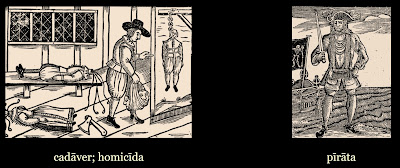Ōlim Minerva tībiā lūdēbat. Repente ōris imāginem in aquā videt. “Tībia,” inquit “pulchram deam nōn decet.” Itaque magnā īrā ā locō discessit, tībiam humī relīquit. Posteā Marsyās invēnit: tībia, quod nūper os deae tetigerat, ubi Marsyās lūdēbat, sonōs mīrōs et dulcēs ēmīsit. Magnum erat Marsyae gaudium: etiam Apollinem ad certāmen prōvocāvit. “Mūsae,” inquit “inter nōs iūdicābunt; victor victō [i] supplicium cōnstituet.” In spēluncā certāmen habēbātur: Apollō citharā, Marsyās tībiā lūdēbant. Mūsārum arbitriō penes [ii] Apollinem erat victōria. Tum deus hominem īnfēlīcem propter superbiam crūdēliter pūnīvit: ad arborem vīnxit et cutem ā vīvō homine dētrāxit. Ē spēluncā, ubi sanguis humī cecīderat, fluvius fluēbat: tībia fluviō ad aliam terram portābātur, ubi Apollinī in templō dēdicāta est.
[i]
victō: this is an example of a perfect passive participle being used as a noun
i.e. the person who has been conquered
[ii]
penes [+ accusative]: in the power / possession of
[A]
[1]
Lines 1 – 4 (Ōlim … ēmīsit)
In
which order are the following statements made?
- being angry
- being inappropriate for a goddess
- finding the flute
- leaving the flute behind
- playing the flute
- seeing a reflection
- sweet sounds
- touching the mouth of a goddess
[2]
Lines 4 – 5 (Magnum … cōnstituet)
- What did Marsyas decide to do? (1)
- What would be the role of the Muses? (1)
- Who would decide the loser’s punishment? (1)
[3]
Lines 6 – 7 (In spēluncā … victōria)
Give
details about the competition and the outcome. (5); [i] In spēluncā
certāmen habēbātur: [ii] Apollō citharā, [iii] Marsyās tībiā
lūdēbant. [iv] Mūsārum arbitriō [v] penes Apollinem erat victōria.
[4]
Lines 7 – end: (Tum … dēdicāta est.)
- What was the reason for punishing Marsyas? (1)
- Describe the punishment (4); [i] ad arborem [ii] vīnxit et [iii] cutem [iv] ā vīvō homine dētrāxit.
- Translate: Ē spēluncā, ubi sanguis humī cecīderat, fluvius fluēbat: tībia fluviō ad aliam terram portābātur, ubi Apollinī in templō dēdicāta est. (9)*
[B]
Note the three passive verbs in the text and give the translations
[C]
Give the first person singular present tense of the following verbs from the
text:
- relīquit [line 2]
- tetigerat [line 3]
- ēmīsit [line 4]
- vīnxit [line 8]
- dētrāxit [line 8]
- cecīderat [line 9]
[D]
Identify the case of each of the following nouns and explain why it is being
used
- ōris [line 1]
- deam [line 2]
- magnā īrā [line 2]
- humī [line 2; line 9]
- sonōs [line 3]
- Apollinī [line 10]
“No
matter how good a pride-filled mortal may be at his art, he can't win against a
god and shouldn't even try. Should the mortal manage to earn the prize for the
contest itself, there will be little time to glory in victory before the
angered deity exacts revenge.”
https://en.wikipedia.org/wiki/Marsyas
____________________
*[i]
From the cave [ii] where the blood had fallen [iii] on the ground, [iii]
a river flowed: [iv] the flute was carried [v] by the river [vi] to
another land, [vii] where it was dedicated [viii] in a temple [ix] to Apollo.
































